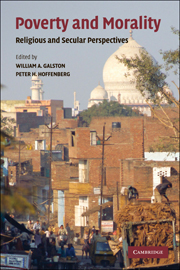Book contents
- Frontmatter
- Contents
- Contributors
- Acknowledgments
- 1 Introduction
- 2 Global Poverty and Unequal Development
- 3 The Karma of Poverty
- 4 Poverty and Morality in Christianity
- 5 Classical Liberalism, Poverty, and Morality
- 6 Confucian Perspectives on Poverty and Morality
- 7 Poverty and Morality
- 8 Hinduism and Poverty
- 9 The Problem of Poverty in Islamic Ethics
- 10 Jewish Perspectives on Poverty
- 11 Liberal Egalitarianism and Poverty
- 12 Marxism and Poverty
- 13 Poverty and Natural Law
- 14 Afterword
- Select Bibliography
- Index
- References
7 - Poverty and Morality
A Feminist Perspective
Published online by Cambridge University Press: 05 June 2012
- Frontmatter
- Contents
- Contributors
- Acknowledgments
- 1 Introduction
- 2 Global Poverty and Unequal Development
- 3 The Karma of Poverty
- 4 Poverty and Morality in Christianity
- 5 Classical Liberalism, Poverty, and Morality
- 6 Confucian Perspectives on Poverty and Morality
- 7 Poverty and Morality
- 8 Hinduism and Poverty
- 9 The Problem of Poverty in Islamic Ethics
- 10 Jewish Perspectives on Poverty
- 11 Liberal Egalitarianism and Poverty
- 12 Marxism and Poverty
- 13 Poverty and Natural Law
- 14 Afterword
- Select Bibliography
- Index
- References
Summary
Feminism is not a moral discourse per se, in many people’s views, but a political one. It is centered on power: the power that men have over women, and the resulting lack of power that women have over property, in the determination of laws, in the practice of political authority, over their own lives, over their children, and over their own bodies. Moreover, to a large extent, feminism is dedicated to practical issues rather than “ethics” per se as a formal discourse: domestic violence, sexual assault, sexual harassment, pornography, pay equity, and job discrimination are more central issues to feminism than, say, questions of “the good.” Feminism also, of course, has far more esoteric leanings into literary theory, philosophies of the body, and the metaquestion of “the meaning of woman” itself. Issues of “the body,” defining sexual identity and sexual desire, and the relationship between gender and sex are not generally considered “moral” issues, even though they are highly philosophical.
But these various forms of feminism do have an obvious moral component, and morality underlies most of these other kinds of arguments: it is essentially a demand for the recognition that women (no matter how you define them) be treated as full human beings. That is, at its base, the essence of feminism, the recognition of women’s full humanity and their treatment as moral equals, not just of men of their own demographic (because racism and classism ensure that many men are also discriminated against), but of men of the privileged group. Throughout the history of philosophy and political thought, women have been considered lesser human beings, from Aristotle’s theory that women had no souls and contributed nothing to reproduction except to serve as incubators, to Rousseau’s argument that women must be subordinate to their husbands, to Rawls’s argument that male heads of families were the appropriate subjects of justice. The moral foundation of feminism, I maintain, is the requirement that we recognize and honor the full humanity of women. I do not here enter into a detailed philosophical argument defending the claim that women’s humanity is downgraded even today, but many of the facts that I report here about women and poverty will substantiate my claim. Amartya Sen’s argument for the millions of “missing women” – girls who were presumably aborted or killed at birth, or died in childhood because of abuse and neglect, simply because they were girls – is only the most overt evidence that this claim is justified and that women are throughout the world and throughout history considered less valuable as human beings, less capable of controlling their own lives, not to mention the lives of others, less worthy of the rights and entitlements that states and societies routinely grant men. However, poverty is a topic that reveals and supports this assertion, and as I talk about poverty from a feminist perspective, I accept this as the moral foundation of feminism: feminism seeks to establish the full humanity of women in a world that seeks to deny it.
- Type
- Chapter
- Information
- Poverty and MoralityReligious and Secular Perspectives, pp. 134 - 159Publisher: Cambridge University PressPrint publication year: 2010



